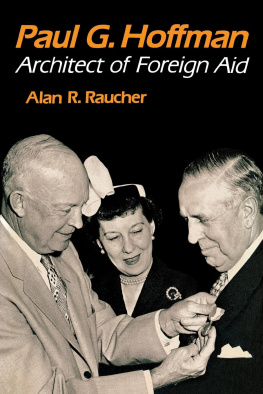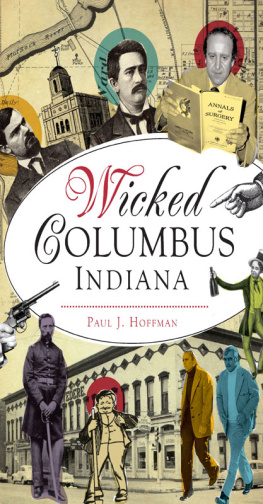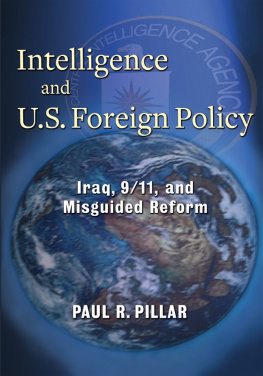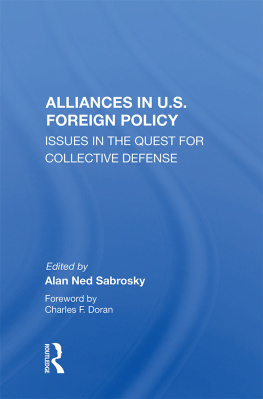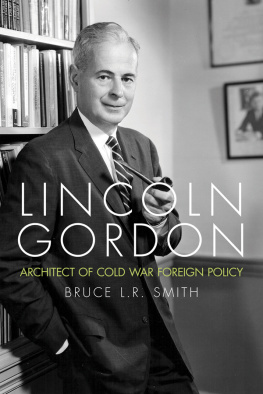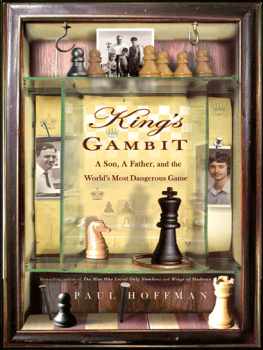Copyright 1985 by The University Press of Kentucky
Scholarly publisher for the Commonwealth, serving
Bellarmine College, Berea College, Centre College of
Kentucky, Eastern Kentucky University, The Filson Club,
Georgetown College, Kentucky Historical Society, Kentucky
State University, Morehead State University, Murray State
University, Northern Kentucky University, Transylvania
University, University of Kentucky, University of Louisville,
and Western Kentucky University.
Editorial and Sales Offices: Lexington, Kentucky 40506-0024
Library of Congress Cataloging-in-Publication Data
Raucher, Alan R.
Paul G. Hoffman, architect of foreign aid.
Bibliography: p.
Includes index.
1. Hoffman, Paul G. (Paul Gary), 18911974Biography. 2. BusinessmenUnited StatesBiography. 3. Government executivesUnited StatesBiography. 4. Automobile industry and tradeUnited States. I. Title.
HC102.5.H63R381985973.90924[B]81-13406
ISBN: 978-0-8131-5626-2
Preface
Into a long life of eighty-three years, Paul G. Hoffman crowded many notable successes and achievements. By 1948, when President Truman appointed him to administer the multibillion-dollar Marshall Plan, he had already earned fame and fortune as the president of the Studebaker Corporation and as an articulate spokesman for business progressivism. After he left the Marshall Plan, he went on to a series of important positions, culminating with his direction of the United Nations development programs, from which he finally retired at the end of 1971.
As a businessman and as a public figure, Hoffman understood well the importance of public opinion and mass communications in the modern world. He became an adept publicist who knew how to communicate with the public and how to cultivate journalists. With the help of assistants and public relations advisors, he delivered hundreds of speeches and published hundreds of articles, as well as several books. He engaged in those activities not simply because he craved the limelight; more important, he sought to publicize himself in order to personalize the otherwise impersonal institutions he led. It is not unfair to say that he created his own public image.
Nonetheless, he was genuinely modest. He felt that a biography about him would not be worthwhile or interesting. To a magazine editor seeking information, he wrote, There are altogether too many biographies kicking about for the good of the world. That modesty did scant justice to his accomplishments.
Although he won praise and honors from contemporaries, Hoffman now seems in danger of slipping into historical obscurity. Occasionally he is remembered in connection with particular incidents or organizations, and Theodore H. Whites recent autobiography includes a sentimental sketch of Hoffman, one of his few heroes in modern history. But until now no full biography of him has appeared. In textbooks on American history since World War II, he barely gets noticed and is often unmentioned by authors who manage to take note of radical activist Abbie Hoffman and his adversary Julius Hoffman. To put the case simply, Paul Hoffman was too important to be forgotten in that way.
Perhaps he has not received the attention he deserves because he followed two careers: one in the automotive industry and the other in public affairs. Those interested in one rarely care about the other. In the specialized world of automotive history, the story ends with his departure from Studebaker. Conversely, those who focus on his role with the Marshall Plan, the Ford Foundation, the Eisenhower administration, and the United Nations tend to regard his business career as mere prologue to the main events.
Of course, many other successful businessmen, out of a sense of social responsibility or a desire for the challenge of power, also made that transition to public affairs. Men like Bernard Baruch, Averell Harriman, and later Robert McNamara often served as members of presidential Cabinets, government commissions, and other institutions that allowed them to exert influence on public policies. Most commonly for such men, their public roles overshadowed their business activities. With Hoffman, however, the business career itself was noteworthy; in addition, the core of values that formed during his business career had direct bearing on his other activities.
Some may regard him as a shallow booster for free enterprise and the American Way of Life, but it is a mistake to dismiss Hoffman as an administrator-bureaucrat lacking vision or imagination. Without brilliance or originality, he grew intellectually and acquired interest in some of the most important issues of public policy. Because of his network of influential associations and his standing within the so-called Establishment, what he did and what he said are significant. This biography seeks to examine those aspects of his career in order to shed light on how the national leadership confronted the modern world.
To understand how Hoffman impressed his contemporaries, it is necessary to take note, however superficially, of his personality and his character. All the evidence reveals a man of remarkably sunny disposition. His optimism and confidence may not always have been warranted by the circumstances, but they made him a doer, not a brooder. Moreover, his natural decency, courtesy, sincerity, and good humor inspired others. He possessed the ability to persuade and to motivate without a touch of slickness. Widely different types of peoplesubordinates, peers, men of power, and cynical observersrecognized and felt moved by him.
Among the many contemporaries who admired him, Walter Lippmann paid special homage to his character. Not one to mince words when judging leaders on the national or international level, Lippmann declared that with Hoffman, the outside and the inside are all the same stuff; he did not scheme, or play a game, or hide his meaning. Instinctively and intuitively, according to Lippmann, he possessed the gift of leadership within American democracy.
The exercise of that gift sometimes required courage. It should go without saying that he was no radical; on domestic and foreign affairs he sought to preserve the fundamental features of the American democratic and capitalist system. As an advocate of progressivism and internationalism, however, he aroused particularly vicious personal attacks from right-wing extremists. Yet even when those attacks made life difficult for him, he did not back down.
Fortunately, he also retained the confidence and support of powerful friends. With their help he continued to pursue his public career long after the common age of retirement. In very real ways, his last positions at the U.N. were successful extensions of the internationalism to which he had committed himself during the previous decades. Thus he was able to feel, quite legitimately, that he had used his life in a worthwhile way.



